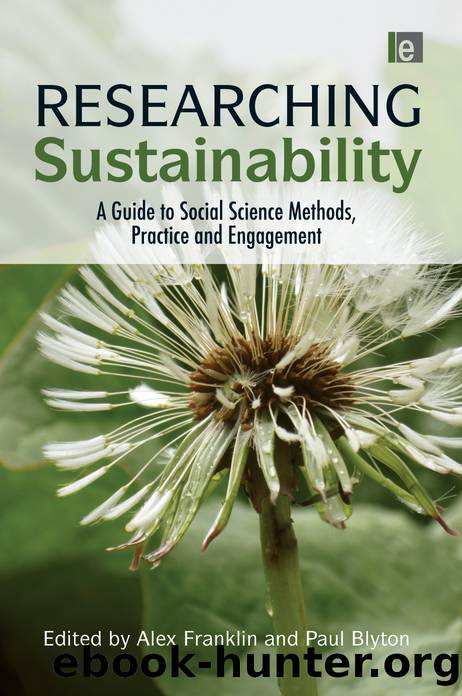Researching Sustainability by Franklin Alex;Blyton Paul;

Author:Franklin, Alex;Blyton, Paul;
Language: eng
Format: epub
ISBN: 1562175
Publisher: Taylor & Francis Group
11
Mediating Sustainability: Constructivist Approaches to Sustainability Research
Robert Lee and Radoslaw Stech
Introduction
Sustainability is a normative concept, being concerned with values towards which we hope to move. Those values and the mechanisms by which we move towards them are crucial for sustainable development. Because sustainability involves issues such as the needs of future generations, the exercise of agreeing on both values and process is bound to be beset by uncertainties. This has led many to conclude that, logically, top-down modes of decision-making might be flawed. They draw on limited experience and understanding. Their capacity for reflection on both the reason for and the most appropriate type of intervention to promote sustainable activity is limited by a lack of participation and runs the risk of neglecting insights and experience that would greatly support the achievement of the sustainable values. In contrast, bottom-up processes better suit the answering of what is largely an empirical question of how sustainability is best served. Such processes do not merely generate a wider range of information, but also advance the legitimacy of the interventions made. Moreover, as we will assert below, the process of involvement in decision-making has considerable value in its own right.
This chapter will present a constructivist-oriented methodology and analyse its usefulness for policy-makers. The constructivist methodology assumes that trained researcher-collaborator engages in a shared and collaborative exploration of issues with participants and that the research process generates co-constructed data and leads to an empowerment of all actors.1 Constructivism has been the subject of increasing attention by researchers in the field of social work, education, international relations and sustainability (Rodwell, 1998; Fischer, 2000; Checkel and Moravcsik, 2001; Morris, 2006; Scholz et al, 2006). Yet, there are continuing debates as to the constructivist epistemology and the difficulties of conducting constructivist research. Moreover, there is a general lack of awareness by policy-makers of the benefits of this particular approach. This is unsurprising, since constructivist research differs substantially from traditional positivist research, where clarity is sought and causation attributed much more readily. It also differs from traditional qualitative tools of inquiry (see Morse, 1998, and discussion below) since the researcher does not solely enter the field in order to collect data, but rather seeks to engage closely with participants and allow them a considerable amount of power over the inquiry process, which concludes with co-constructed findings. Therefore, constructivist research is an empowerment process changing both the inquirer and the participants. As such, the methodology has a normative element that might be seen, at times, in tension with its analytical function.
Constructivist research may complement the activities of policy-makers if performed by trained researchers, equipped with enhanced theoretical knowledge and practical skills, who can engage closely with relevant communities. The aim of such research is to elicit public perception but also to illustrate new concepts, thereby enhancing researchersâ and participantsâ understanding of the problems as a means of generating strategic action plans. Constructivist research aims therefore, at empowering the inquirer and the communities, as well as the consumers of the study, who gain access to a rich account of subjective understandings of community well-being.
Download
This site does not store any files on its server. We only index and link to content provided by other sites. Please contact the content providers to delete copyright contents if any and email us, we'll remove relevant links or contents immediately.
When The Scientist Presents: An Audio And Video Guide To Science Talks (With Dvd-rom) : An Audio and Video Guide to Science Talks by Jean-Luc Lebrun(100)
Best Practices for Teaching Science by Randi Stone(99)
Defending Qualitative Research by Mario Cardano(99)
A Question of Physics by Paul Buckley(99)
Engineering Mechanics 2: Mechanics of Materials by Dietmar Gross Werner Hauger Jörg Schröder Wolfgang Wall Javier Bonet(95)
Improving Research-Based Knowledge of College Promise Programs by Perna Laura W.;Smith Edward J.;(89)
Texts in Computer Science by Orit Hazzan(81)
Solving Everyday Problems with the Scientific Method by Thinking Like a Scientist(80)
STEM the Tide : Reforming Science, Technology, Engineering, and Math Education in America by David E. Drew(80)
Dinaric Perspectives on TIMSS 2019 : Teaching and Learning Mathematics and Science in South-Eastern Europe by Barbara Japelj Pavesić; Paulína Korsňáková; Sabine Meinck(78)
What Successful Science Teachers Do by unknow(74)
Support for Forensic Science Research: Improving the Scientific Role of the National Institute of Justice by Committee on Strengthening Forensic Science at the National Institute of Justice(73)
Researching Sustainability by Franklin Alex;Blyton Paul;(72)
The Leading World's Most Innovative Universities by Abdulrahman Obaid AI-Youbi; Adnan Hamza Mohammad Zahed; Mahmoud Nadim Nahas; Ahmad Abousree Hegazy(70)
A Passion For Discovery (237 Pages) by Peter Freund(66)
A Math-Based Writing System for Engineers. Sentence Algebra & Document Algorithms by Brad Henderson(65)
Awe in research: Igniting curiosity and connection by Sandra Skjaervoe(64)
Solving Everyday Problems with the Scientific Method (234 Pages) by Don K Mak Angela T Mak & Anthony B Mak(52)
Essentials of Science Classroom Assessment by Xiufeng Liu(46)
